Best Fertilizers for Petunias (Plant Food for Blooms)
Generally Petunias like balanced fertilizers that are rich in nitrogen, phosphorus, and potassium for healthy root growth and abundant blooms. For petunias in baskets, make sure to pick a slow-release fertilizer variety.
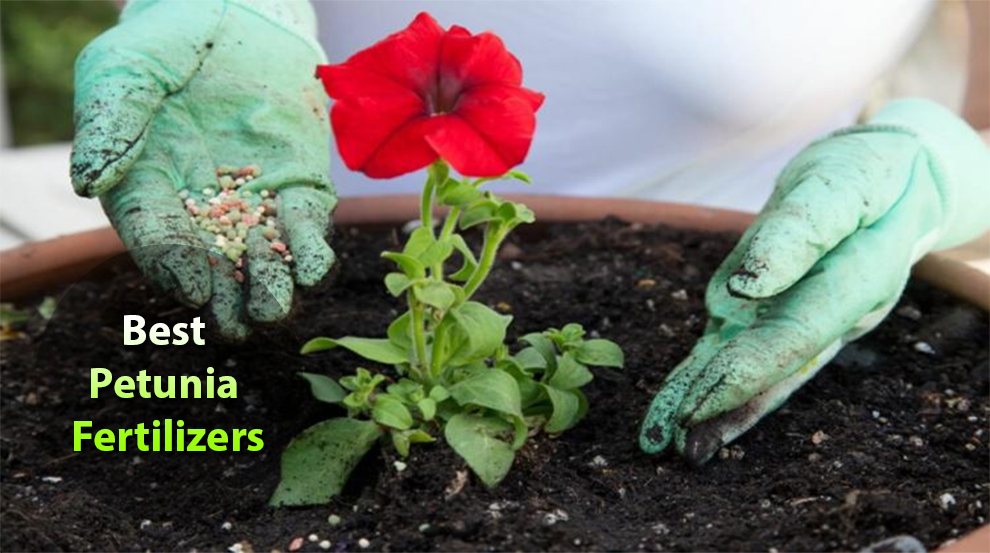
Petunias need regular feeding to support their growth and flowering. Without adequate nutrients, they may become stunted, have a shorter lifespan, and produce lesser blooms.
The best petunia fertilizer is a mix of potassium, phosphorous, and nitrogen, crucial for plant growth and development.
Nitrogen helps with healthy foliage growth, phosphorous support solid flower production and root development, and potassium helps them resist diseases and stress.
One of the specialized fertilizer for petunias include Jack’s Classic. It is a great choice if you live in an area with hard water. It helps petunias absorb iron efficiently.
Best Fertilizer For Jade Plant
- Best Water-Soluble Fertilizer for Petunias – Premium Water Soluble Fertilizer
- Best Liquid Fertilizer for Petunias – Schultz 10-15-10 All Purpose Fertilizer
- The Best Fertilizer for Wave Petunias (All Purpose) – Miracle-Gro All Purpose Water Soluble Plant Food
- Best Fertilizers for Petunias in Baskets – Jobe’s 06105 Spikes Fertilizer
Petunia Fertilizer Requirements
Petunias desire a balanced fertilizer with a mix of vital nutrients, including nitrogen, phosphorous, and potassium, to grow and thrive.
Beyond these macronutrients, the ideal petunia fertilizer will also have some micronutrients like calcium, magnesium, or iron for optimal development and growth.
Typically, these nutrients are found in soil. However, they may not be available in sufficient quantities or sometimes the plant is unable to absorb them readily.
It is when the need for fertilizer pops up. Plant foods offer the petunias the necessary nutrients to stay healthy and grow strong.
When wanting to select the best feed for petunias, you must select a fertilizer formulated for petunias or flowering plants in general. These plant foods will have the optimal mix of nutrients for petunias.
It is crucial to read through the package instructions when applying the fertilizer. Ideally, feeding petunias every two to three weeks during the growing season is ideal.
It helps petunias receive the nutrients they need to yield abundant blooms and maintain healthy growth.
Best Plant Food For Petunias That You Can Buy
Here is a list of the six best options when contemplating what to feed your petunias.
1. Jack’s Classic J R Peters Inc 52624
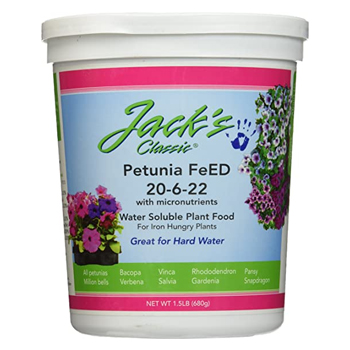 |
Check price on Amazon |
It is a water-soluble, granular fertilizer with an NPK ratio of 20-6-22. Beyond the essential macronutrients, it contains sulfur, magnesium, and calcium.
Jack’s Classic gives the plant a well-balanced diet, helps produce lush green plants, and enables it to grow to its full potential.
It is the perfect fertilizer for plants that do not take up iron by themselves in the root zone, like petunia. It will also suit your plant well if you live in a zone with hard water.
How to use: Dissolve it in water per the package instructions and use it to water your petunias every two to four weeks during the growing season. Alternatively, sprinkle the granules directly over the soil around the petunias and then water them.
2. Miracle-Gro All Purpose Water Soluble Plant Food
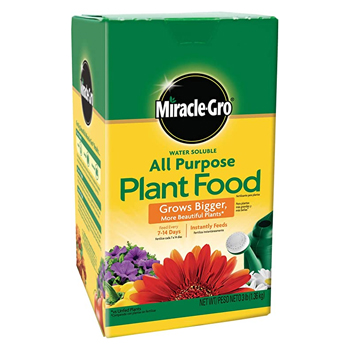 |
Check price on Amazon |
Miracle-Gro is an all-purpose water-soluble fertilizer for various plants, including petunias. It has an NPK ratio of 24-8-16 but contains other essential nutrients.
Together its nutrient composition helps the plant grow bigger and more beautiful. You can use this plant food with a Miracle-Gro watering can or feeder and feed the petunias every one to two weeks during the growing season.
Miracle-Gro is one of the best feed for petunias safe for all plants and does not burn if used as directed. It starts to work instantly.
How to use: For use on the outdoor plants, mix one tablespoon of Miracle-Gro for every gallon of water, and for indoor plants, mix ½ teaspoon per gallon of water.
Fill the watering can to mix the plant food and feed the plants while watering by soaking the plant’s base. Read through the instruction on the packaging label for the best results.
3. Osmocote Smart-Release Fertilizer
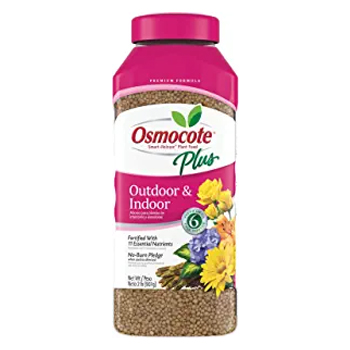 |
Check price on Amazon |
Osmocote is an original slow-release plant fertilizer. It has undergone decades of field testing, confirming the product’s effectiveness with hundreds of plant species in various soil and climatic conditions.
Each of its homogenous granules has a 15-9-12 NPK ratio. In addition, they also have micro and secondary nutrients that feed the plant for up to six months.
The soil temperature controls how quickly or slowly the fertilizer releases the nutrients and how plants absorb them.
Every pound of Osmocote covers 37.5 square feet. The fertilizer works best when mixed into 1-3 inches of soil.
Fortunately, it is a mistake-proof fertilizer. So, if you overapply it up to 3X the recommended rate, it will still not burn the plant.
How to use: For application, sprinkle one scoopful of plant food for every four square feet or two gallons. Mix into the top one to three inches of soil. Water the plants thoroughly after application and reapply every six months.
4. Schultz 10-15-10 All Purpose Liquid Fertilizer
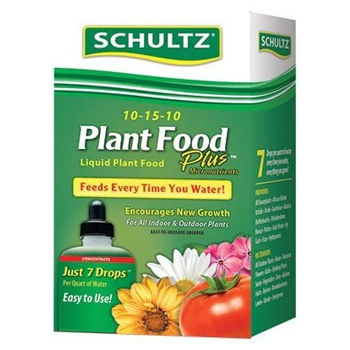 |
Check price on Amazon |
It is an excellent all-purpose plant food that works for all indoor and outdoor plants and encourages new growth. This could be the best fertilizer for petunias that works its magic in just seven drops and a watering session.
This Schultz has a 10-15-10 formulation. You can use it for rooting, transplanting, and repotting. One of the likable attributes of this plant food is that it feeds the plants just as nature does by delivering nutrients to the roots with every watering.
5. Jobe’s 06105 Spikes Fertilizer
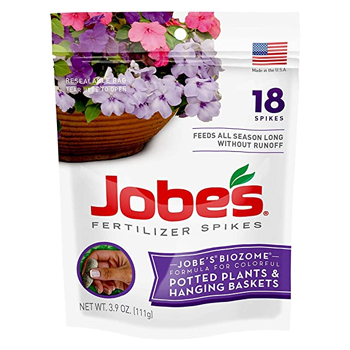 |
Check price on Amazon |
This fertilizer in spike form is meant for hanging baskets and potted plants. It is a slow-release plant food that releases a small and steady amount of nutrients over time to keep the plants happy and healthy across the season.
Whether you are just starting out or a seasoned gardening pro, Jobe’s spikes will be easy to use and insert around the plant’s drip line. It does not amount to any hazards, mess, or wasteful runoff.
The spikes go right to the plant as food. Hence, there is never stress about the plant food running off anywhere around you. Every spike gives the plant the correct dose of nutrients.
How to use: Jobe’s fertilizer is easy to use. Insert the spike into the potted plant, and the slow-release formula will feed the plant for up to eight weeks. Spikes are a pre-measured, exquisitely formulated plant food that does not wash away like other fertilizers.
6. Bio Advanced All-In-One Plant Food
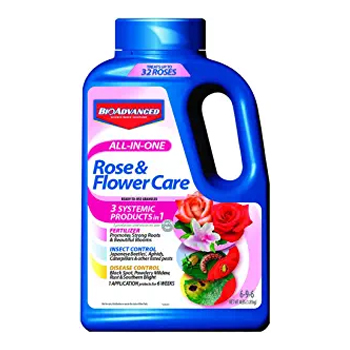 |
Check price on Amazon |
It is an excellent plant food that helps promote beautiful blooms and strong roots.
The Bio Advanced plant food also kills insects like leafhoppers, aphids, and Japanese beetles and controls fungicide diseases like Southern Blight, rust, powdery mildew, and black spots.
It guarantees systemic rainproof protection and lasts for up to six weeks. You can get it in 4-pound, 32-ounce, and 64-ounce quantities.
7. Premium Water Soluble Fertilizer
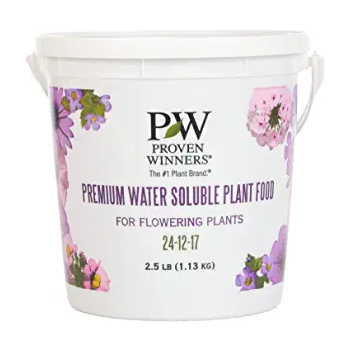 |
Check price on Amazon |
It feeds the plant for six months with a single application. It is easy to use and comes in a 2.5 lb container with a carrying handle and measuring scoop.
This water-soluble fertilizer has a 24-12-17 fertilizer blend and is ideal for window boxes, hanging baskets, landscape beds, and containers.
How to use: For application, you must follow the application rate on the container and apply on every third watering or at least once every seven days in the spring.
While fertilizing, be cautious so you do not disturb the roots. Its formulation boosts performance and improves plant life. This unique blend helps with heavy flowering in fast-growing plants.
The Best Fertilizer For Petunias In Pots
The petunias growing in pots have relatively different feed requirements than those growing in hanging baskets or on the ground.
In the containers, petunias care needs entirely rely on the nutrients in the potting mix, which may deplete over time. Hence, you must pick a feed exquisitely formulated for container plants to offer the necessary nutrients for healthy blooming and growth.
One of the best plant food for petunias grown in pots is Jack’s Classic All Purpose Water Soluble Plant food. This fertilizer offers container plants a balanced mix of vital nutrients, including potassium, phosphorous, and nitrogen. It also has micronutrients that petunias need to thrive.
Dissolve the recommended amount of fertilizer in water as stated on the package instructions and apply it every one to two weeks during the growing season.
It helps ensure that petunias in the pot get the crucial nutrients to produce abundant blooms and show healthy growth.
Related: Petunia Lifespan
How To Fertilize Petunias?
Petunias are lovely flowering plants. They need regular fertilization to grow and bloom to their maximum potential. There are several methods of feeding petunias. These include granular fertilizers, liquid fertilizers, and spikes.
1. Spike: These are a popular choice for feeding petunias. They are easy to use and offer a slow release of nutrients over time.
To use spikes, you have to insert them into the soil near the plant’s roots. Follow the package instructions for correct application frequency and spacing.
Spike fertilizers usually last for three months and are a convenient option for gardeners who wish to fertilize petunias without frequent applications.
2. Liquid: These are another popular option to feed your petunias. These are fast-acting and can be applied directly to the plant’s soil or foliage. Liquid fertilizers are absorbed quickly by plants.
They offer them an instant boost of nutrients to encourage blooming and growth. To use, dilute the liquid fertilizer, as per the package instructions and apply them directly to the plant’s foliage or soil.
3. Granular: These are slow-release options for fertilizing the petunias. They are applied directly to the soil and they release nutrients over time as they dissolve.
Granular fertilizers are perfect for gardeners who prefer a hands-off approach to fertilizing, as they can be more conveniently applied to a larger space as compared to spike or liquid fertilizers.
For application, apply the granular fertilizer to the soil around the plant’s roots, adhering to the package instructions for the correct proportion and application frequency.
So, whichever is the best petunia fertilizer suited to your plant, please pick one exquisitely formulated for flowering plants. It will offer the necessary balance of nutrients for a healthy petunia growth rate and blooming.
When Is The Best Time To Fertilize Petunia?
The best time to fertilize the petunias depends on the type of fertilizer used. Generally, feed the petunias when they are actively blooming and growing during the summer and spring.
Fertilizing too early in the season may results in excessive foliage growth at the expense of blooms, whereas feeding too late in the season might not offer the plant ample nutrients to grow to its full potential.
How Often Should I Fertilize Petunias?
The fertilization frequency depends on the plant’s specific needs and the type of fertilizer employed. Typically, petunias need regular fertilization to encourage healthy growth and blooming.
When using the liquid feeds, you must fertilize every two to three weeks during the growing season (from spring to early fall). They are fast-acting and offer instant nutrition boosts to plants.
With the granular best petunia fertilizers, one application at the beginning of the growing season suffices, followed by additional application as needed based on the plant growth and blooming.
The granular fertilizers provide a slow release of nutrients over time and are a convenient option for gardeners who like a hands-off approach to fertilization.
Spike fertilizers typically offer slow-release nutrients over a period of several months. So, read through the package instructions for the correct application frequency.
Never over-fertilize with spike fertilizers. It can result in excessive foliage growth and reduced blooming.
Further, consider the petunia plant’s specific needs when determining the fertilization frequency. Those growing in the containers need more frequent feeding than the ones growing in the ground, as the nutrients in the soil deplete more quickly.
Some of The Best Homemade Fertilizer For Petunias
Homemade fertilizers are eco-friendly and cost-effective to offer vital nutrients to petunias. Here are some of the top options you can consider:
A. Can you use eggshells for petunias?
Yes.
You can use eggshells for different types of petunias to provide the plant with calcium, a vital nutrient for healthy plant growth.
You can add crushed eggshells directly to the soil around the petunias by sprinkling them on the surface and watering them or digging them into the soil.
The calcium strengthens the petunia’s cell walls, prevents blossom-end rot, and promotes healthy root growth.
B. Is coffee a good fertilizer for petunias?
Coffee grounds can be an excellent fertilizer for petunias as they contain nitrogen, potassium, and phosphorous, essential macronutrients for plant growth.
Nitrogen helps with healthy foliage growth, and potassium and phosphorus are necessary for root development and flower production.
But please note that coffee grounds are acidic. So, if you overuse them, they can lower the soil pH and harm petunias.
C. Is Epsom salt good for petunias?
Yes, Epsom salt can be the best homemade fertilizer for petunias. Epsom salt is a magnesium sulfate compound that offers vital nutrients to petunias.
Magnesium is a crucial nutrient for petunias as it is necessary for chlorophyll production. Chlorophyll helps in photosynthesis.
Sulfur is also imperative for plant growth as it helps with protein synthesis and other metabolic processes.
Applying Epsom salt to the soil around petunias can promote healthy foliage growth and bloom.
D. Can you use Banana peels for Petunia blooms?
Bananas contain potassium and are beneficial for petunia blooms. Potassium also strengthens the stems and facilitates healthy flower development.
It also betters petunias’ resistance to diseases and stress. But do not overuse bananas or banana peels, as they can attract pests and cause fungal growth.
E. Can you use fish emulsions for petunias?
Yes, you can use fish emulsions as a homemade fertilizer. Fish emulsion has fish remains processed for human consumption and other uses. It is a good source of phosphorous, nitrogen, and trace minerals vital for plant growth.
